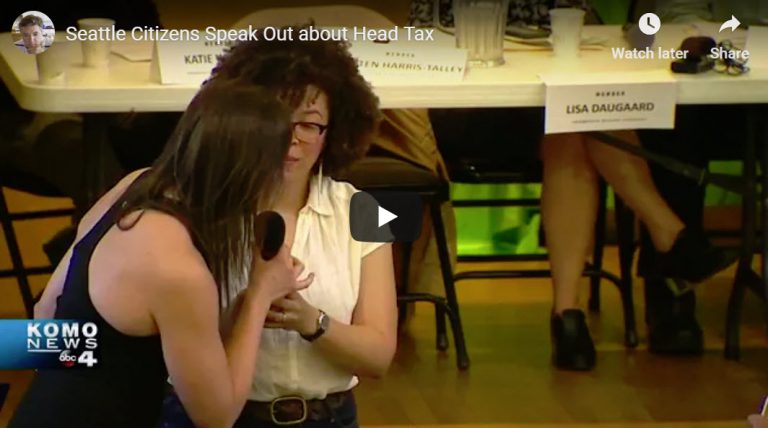“Seattle is Dying” : KOMO News Special
Last night, an hour-long program aired without commercial interruption in Seattle on the addiction crisis and homelessness. It’s an important watch. I found it devastating, riveting and motivating, all at once.
There is already much being made over the fact that (a) it comes from KOMO News, a station now owned by Sinclair Broadcasting, a large conglomerate which has an unquestionably conservative lens. And that (b) there is direct footage within this broadcast of people — who, I should add, are in public, not private places — who are suffering, some in mental breakdown and in crisis. And (c) the piece leads off with the recent System Failure Report, an important report about repeat offenders (read it!) — but also which, as SCC Insight carefully noted, has some some important caveats to consider about its interpretation.
Before I go further, it must not be left to a footnote that the main journalist, Eric Johnson, has been a part of the Seattle journalism community for more than two decades, has deep ties to the Puget Sound community, and has long profiled Seattle life with high quality, decades before the change in station ownership. If you’d like to thank him for bravely breaking out of the “it’s all about Amazon” media narrative and tackling a difficult, controversial issue which will no doubt bring him a lot of ideological heat, please drop by his Twitter feed.
Issues (a) through (c) above are each legitimate concerns, and they are worth deeper sidebar discussions. They should absolutely add some nuance to the viewing, and people should discuss them.
But they should not be allowed to overshadow the central message, because none of them invalidate the central, monumental, devastating theme of what is being reported. And what’s being reported is that we have an addiction crisis in Seattle, that the homelessness crisis is primarily but not solely driven by addiction, and our existing policy regime is broken.
Very broken. People need help from our leaders, and that includes both those suffering, our first responders, residents and business communities. This is not, primarily a “tech displacement” story, nor is it primarily a “lack of compassion” story, nor is it primarily a “police need to do a better job” story. And it is absolutely not a “let’s do more of what we’re doing” story.
If you’re more focused on the filming of individuals already in public who are suffering than the systemic problem our policymakers exacerbate, stop and ask yourself what you are fighting for.

Is our policy approach working? No? OK, we agree on that. Do we want far fewer people addicted and homeless? Yes? OK, we agree on that too.
So let’s say we snap our fingers and there’s suddenly thousands of permanent, publicly-operated individual housing units with addiction treatment services. That’s great, and I support that. But before going further, answer: What then? Would you be willing (as I am) to mandate that those who are addicted to go through such treatment, or go to jail? Do you believe that without mandating treatment, those profiled will suddenly get well? Do you believe that data about their unique needs and touch-points with the city are important to measure, to know more about whom we are treating, what they need, and how they’re progressing? Do you believe that there are a substantial number of crimes that could be prevented if we did warrant checks among the population at various touchpoints with taxpayer-paid services? Do you believe the citizens who fund these services have any right to demand the most basic of database checks? Do you believe the unhoused are actually most at risk for violence and crime, and that we have an obligation to do what we can to limit it in the shelters or encampments we do tacitly allow? Do you believe that public safety will magically improve with free housing, without a change in how we handle addiction and repeat offenders?
In other words, would you be willing to implement a Providence RI style approach? Would you be willing to try it on a small scale at least? Ask yourself that, and state your public answer, and the ideological divide between approaches might begin to be bridged.
Which is more important — fewer people addicted and suffering, or proving the “correctness” of your own (or my own) specific political ideology or power desires or what-have-you which we don’t want challenged? Does the story above suggest that simply building more housing and low-barrier tiny villages without any “asks” of those residing with them will magically solve the problem? Has it, where it’s been tried? (That was basically the Licton Springs model. How well did it work?)
Or does it appear to be that the central problem is that of addiction and our revolving, permissive approach, and a City Council that prefers not to touch an entrenched, ideological third-rail, and one which actually benefits politically by leaving it alone? What do first responders say? And why do they feel they need to be anonymous to be honest?
When our police feel they must be anonymous or retired in order to be honest, what does that suggest?
I don’t think most Seattleites would agree that the current policy approach is working, and I would ask what you are truly fighting for. We need the City Council to start holding hearings on this in an honest, transparent way. We need to begin exploring much more proactive approaches, such as the ones used in Providence Rhode Island and Snohomish County and Boston and elsewhere — those regions have seen dramatic improvements in the very measures where we’ve seen failures.
Some of us think it’s time to change the broken policy agenda that we’ve been pursuing, and time to take a new approach.
Seattle City Council, can we please stop spending time and money and focus passing symbolic resolutions on national issues and get to work? Can we please stop dishonestly portraying homelessness as just (or even primarily) a tech affordability displacement issue? It’s been more than three years since we declared a state of emergency on homelessness. Our approach isn’t working.
Seattleites, you can help push for better solutions. There are many ways to help. Write the Seattle City Council and demand better action. Contact the City Attorney and ask some good questions. Send your thoughts, even this blog post if you care to, to the Mayor. Push back when you hear people championing the shibboleth that it’s just about needing even more money without a change of policies. Consider joining one of multiple volunteer organizations. One of the ones I’ve found suits me best is the diverse group of citizens seeking evidence-based solutions at SPEAK Out Seattle.
At a minimum, resolve to improve your information diet. Don’t just read The Stranger’s take on it. Follow SOS at https://twitter.com/sos_seattle, or better yet, join us at SPEAK OUT Seattle on Facebook. Read the System Failure Report. Share this video, even this post if you care to, with neighbors and coworkers. And please consider attending the free City Council candidate forums in March through June in your neighborhood (see @SOS_Seattle on Twitter), and ask your district candidates what their take is on the addiction crisis in Seattle. And of course, there are numerous organizations that directly help today’s urgent need and those struggling with poverty and addiction, from King County United Way to Community Lunch to food banks like the amazing University Food Bank to Habitat for Humanity Seattle – King County to clothing donors and more. Most important, for the mid and long-term, we have to right this ship.
Major citywide elections are coming up in August (primary) and November (general), where 7 of 9 City Council spots are up for vote. This provides hope, for the first time in a long while, to change our direction. I’ll have more to say about the City Council candidates I feel have the best shot at changing our policies for the better in a future post; right now, I’m only starting to eliminate a few from further consideration. If interested, follow me on Twitter.
Disclosure: I donate time/money to several of nonprofit organizations mentioned above, but I do not speak for any of them.







Great post. Identified the main driver in this mess we are in – Addiction. The word that many people don’t want say. Thanks.
When our “liberal” media starts to finally step up and speak the truth we may FINALLY begin to address this issue. It starts with voting the local politicians out of office and bring in people with the courage to step up and address the true issues facing this city.